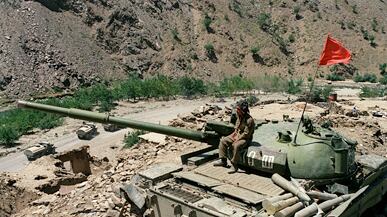The top-secret minutes, now declassified, make for a gripping, terrifying read.
Here they are, the top policymakers, meeting behind closed doors to discuss what to do about the worsening situation in Afghanistan. There is disagreement, born of frustration—the whole enterprise has become incredibly costly; it is dragging on, and unsavory compromises increasingly seem inevitable.

Some argue for a push forward, the commitment of even more forces. Others think it’s time to negotiate with the extremists. Some just want to get out. “We can leave quickly, saying that the former leadership was to blame for everything,” one official suggests, but is overruled. There are security concerns as well as the matter of international respect and credibility. To pull out, the argument goes, will embolden extremists everywhere.
ADVERTISEMENT
Reading these minutes but blotting out the names and the dates, you might think you are reading Bob Woodward’s recent book, Obama’s Wars. But these documents detail a debate among another “innermost” circle—the Soviet Politburo debating the faltering policy in Afghanistan during the 1980s.
And the parallels are striking.
First off, there was the problem of holding the territory that had been won in battle. Soldiers can drive the insurgents out but as soon as the troops “return to their bases, the regions fall back under the control of the rebels,” as one official notes. Leaving smaller detachments behind to “hold” the territory didn’t work, and pursuing and killing the insurgents led to too much collateral damage. “In the course of those operations, the houses and fields are often destroyed, the civilian population is killed, and in the end everything remains the same,” an expert noted.
So there was talk of a military surge combined with a program of “tribal engagement,” seeking the backing and cooperation of local tribal leaders. Once an area had been stabilized, there would be a push for economic development to garner the support of the local population.
But then there was the problem of the local security forces.
The only real difference between the Kremlin documents and the contemporary U.S. policy debate is that we know how the first debacle ended.
“I do not believe even for a moment that an Afghan army can be created, regardless of how much we invest in it. Nonetheless, we do not have an alternative,” as one official bitterly complained.
“Our efforts over the last eight years have not led to the expected results. Huge material resources and considerable casualties did not produce a positive end result—stabilization of the military and political situation in the country,” another concluded.
The leaders in the Afghan government had turned out to be neither competent nor trustworthy. Instead of doing what was best for their country, they engaged in petty squabbles and were busy enriching themselves. The information they provided was unreliable and they fought among themselves.
Meanwhile, the Afghan president acted erratically and doubts had arisen about his mental health. “A deep political crisis of the Afghan society is obvious,” one participant glumly concluded.
And then there was Pakistan. Its government needs to be pressed much harder, the group agreed. Pakistan had to stop allowing the insurgents to operate from its territory across the border.
At the conclusion of the increasingly anguished meetings came the inevitable session when the group finally abandoned all hope of success in Afghanistan and decided to withdraw before even more precious resources were squandered and more lives lost.
The surge only had only brought more exposure, more casualties and more resentment on the part of the Afghans. The difficult terrain defeated modern military technology. Plus, Afghan society was too divided and the leadership too inferior to capitalize on any military gains. It was time to leave. “There is a reason why people say that each person is a unique world, and when that person dies, that world dies forever,” the surprisingly emotional, philosophical official statement noted.
It is hard to read these documents and hold on to the honest hope that we can do better. The Soviets, who were far from stupid or inept, had world-class regional experts and strategists and anthropologists and linguists on their team. There are no ideas or any alternative strategies that the Soviets didn’t try. The only real difference between what is in the Kremlin documents and the contemporary U.S. policy debate is that we know how the first debacle ended.
The circumstances that defeated them were nearly identical to what we are facing today—from malicious obstruction by regional rivals to the double-dealing by Pakistan. Afghanistan has been called the graveyard of empires; it is perhaps more accurate to call it the graveyard of hubris.
Former Soviet premier Mikhail Gorbachev has vehemently urged the U.S. to end its Afghan intervention and withdraw its forces as quickly as possible, stating that victory is impossible. Gorbachev isn’t just any random pundit. His perestroika changed global politics, ended the Cold War, and won him a Nobel Peace Prize. As a leading policy maker, who experienced the Soviet Union’s own painful Afghanistan venture and ultimately oversaw the withdrawal of Russian troops from that country, he may be assumed to have some insights to contribute.
In the U.S., however, the twin reactions to his advice have been: disinterest and cynicism. The few commentators who could be bothered to react at all mostly attributed his remarks to sour grapes—the Soviet Union suffered a huge, even catastrophic setback in Afghanistan, and the U.S. operating through its Afghan surrogates was largely responsible, they imply, so he just wants to see us suffer the same fate.
A dispassionate comparison of the two superpower interventions, however, suggests that motives and agendas aside, Gorbachev’s advice—and particularly his plea that we “learn from the Russian experience”—deserves very serious consideration.
Reading the Kremlin documents, it is clear: Gorbachev’s warning is worthy of very serious consideration.
Dr. Cheryl Benard is a writer based in Washington, D.C., and the president of The Bamiyan Project, a nonprofit organization that supports cultural activists in areas of conflict and post-conflict. From 2001 until 2009, she was the director of the Alternative Strategies Initiative at the RAND Corporation. Her books include Civil Democratic Islam, Women in Nation-Building , and the forthcoming Behind the Wire, Detainee Operations in Iraq .





